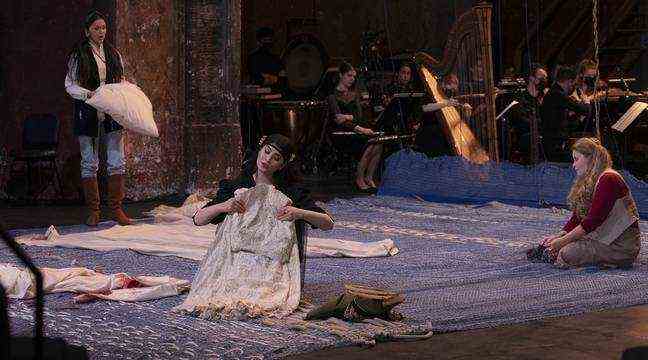“The Rape of Lucretia”, presented from May 19 to 29 at the Bouffes du Nord – Vincent Lappartient
- For its reopening, the Bouffes du Nord theater presents “Le Viol de Lucrèce”, an opera composed by Benjamin Britten and directed by Jeanne Candel.
- Until May 29, spectators will be able to discover the young talents of the Paris Opera academy and the musicians of the Orchester-Atelier Ostinato.
- 20 minutes slipped backstage at the theater a few hours before the show premiered.
“Sing in the direction of the stands, pretend you are addressing the audience,” exclaims conductor Léo Warynski. This time it will no longer be a matter of pretending. A few hours before the long-awaited curtain-raising, the euphoria of the recovery is felt in the heart of the theater of Bouffes du Nord. On stage, the baritone Timothée Varon pierces with his deep voice the red concrete walls of the theater and brings back to life, for a moment, this place which has been inanimate for many months.
By coincidence of timing, it is with The Rape of Lucretia, that the theater of the 20th arrondissement reopens the ball
this Wednesday. Composed by Benjamin Britten after a play by André Obey, this chamber opera revisits the founding myth of the Roman Republic.
In its distribution, The Rape of Lucretia, directed by Jeanne Candel, honors young singers straight out of the Paris Opera academy, as well as the musicians of the
Multilateral set and the Orchester-Atelier Ostinato, conducted by Léo Warynski. An opportunity to reappear on stage more necessary than ever for these emerging artists, after a very special start to their cultural career.
A first taste of hope
While the musicians tune one last time on stage, the artists warm up their voices in the make-up room. At the heart of this debauchery of vocal energies, the soprano Kseniia Proshina is serene. Her first stint on the boards of Paris, the 26-year-old Russian singer has been preparing for two and a half months. Between Samara, in eastern Russia, France and Italy, the singer has frequently found herself preparing her roles alone in front of a screen, in particular that of Lucia, servant of Lucretia, which she will perform on Wednesday evening . “It’s important to be free and to know how to be alone. I have used the past few months for myself. But now I need to offer this exhilaration to the spectators, ”she confides.
For the young artists of the Paris Opera Academy, this return to the stage suggests a prospect of hope after a period of crisis. Since entering the academy in September 2018, Timothée Varon has experienced a course constantly turned upside down by the news: yellow vests, transport strikes, health crisis … “It is in these moments that we realize the fragility of our art, ”he confides. The 29-year-old singer then took advantage of this first role on stage in the character of Tarquin to take a step back on his future career. “This break allows you to realize that, Covid or not, the job you have been passionate about for years can end overnight. I am all the more grateful for playing this complex role and singing accompanied by an orchestra, ”says Timothée Varon.
Find the public
In four weeks of rehearsals on stage, the director, Jeanne Candel, also co-director of the Aquarium theater in Vincennes, salutes the motivation and progress of the collective: “It was moving to see their first steps on stage. For some, it was their first time in front of spectators, ”she says.
Deprived of the public during confinement, the artists of the Paris Opera academy were nevertheless able to perform online or in front of patrons at events. “A chance,” said Kseniia Proshina, who took part in the project. But that does not prevent some singers from apprehending the fateful moment of the passage on stage. “This time we find ourselves in front of a real audience, the one who paid for his seat to see us so obviously there is a little extra stress. It’s like finding someone you haven’t seen for a long time, ”smiles Timothée Varon.
To recreate this relationship of sharing and transmission without a spectator, Jeanne Candel relied on collective work: “In this work, there are two distributions. But I asked the artists to attend everyone’s rehearsals. They were able to immerse themselves in and learn from others, says the director. She concludes a few minutes before the start of the show: “One of my conservatory teachers told me this sentence ‘it takes a lot of joy to play a tragedy’. And tonight, the energy is there. “

